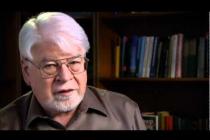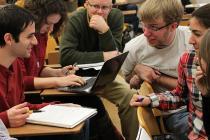Linguistics
Title: The computational linguistics of food, innovation, and community
Title: Laws of form in Perception: Aesthetic theory, the Golden Ratio and Depth Perception
Title: TBA
Abstract: TBA
Probabilistic models of human cognition have been widely successful at capturing the ways that people represent and reason with uncertain knowledge. In this talk I will explore the ways that this probabilistic approach can be applied to systematic and productive reasoning – in particular, natural language pragmatics and semantics. I will first describe how probabilistic programming languages provide a formal tool encompassing probabilistic uncertainty and compositional structure. I'll illustrate with a examples from inductive reasoning and social cognition.
Angela Xiaoxue He will present her dissertation defense on "Verb Learning Under Guidance: Syntax-to-Semantics Inferences."
Winter Storm is the Language Science Center's free, two-week intensive annual workshop for language scientists, taking place this year January 12-23. This year's theme is How to be a MODEL language scientist. Since communication is a key element in making a community like ours a success, the aim for this year's Winter Storm is to advance not only the professional development of our individual community members, but also the development and growth of the Language Science community as a whole.









